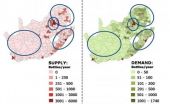(Press-News.org) VIDEO:
Adam Levine, M.D., an emergency medicine physician with Rhode Island Hospital and a volunteer physician with International Medical Corps, was deployed to a field hospital near Misurata, Libya, during the...
Click here for more information.
PROVIDENCE, R.I. -- Adam Levine, M.D., an emergency medicine physician with Rhode Island Hospital and a volunteer physician with International Medical Corps, was deployed to a field hospital near Misurata, Libya, during the conflict there. He and his colleagues cared for over 1,300 patients from both sides of the conflict between June and August 2011. In a paper now available online in advance of print in the African Journal of Emergency Medicine, Levine describes his experience and the lessons he learned that he hopes will aid in future humanitarian efforts.
In the paper, Levine sets the stage for the conflict, and explains, "As physicians working with the humanitarian aid organization International Medical Corps in Libya during this time, we witnessed many of the direct human costs first-hand." Working originally from an old farmhouse near the front-line of the fighting, the goal of the hospital was to treat and send home patients with minor wounds and to stabilize critically injured patients who would subsequently be transferred to two major receiving hospitals.
Though rudimentary, their capabilities were remarkably sophisticated, with X-ray and ultrasound equipment, the means to perform invasive procedures like intubations and chest tube placements, and an operating theater used on a selective basis to provide emergency surgery for those who might not survive a 30-minute transfer to a hospital. The staff generally included two or three expatriate physicians with emergency medical experience, along with three to six Libyan physicians and four to eight nurses. With that limited workforce, the field hospital was able to treat over 1,300 patients in an eight-week period, ranging from less than 10 patients to more than 60 in any given day.
The take-away from his experience, however, is the lessons he learned. As Levine says, "Hospital management is always a complex enterprise, and no place more so than in an active combat zone. However, there are several important lessons that can be drawn based on our experience in Libya, which we believe may be applicable to field hospitals in other parts of Africa or the developing world."
Levine explains the importance of strong logistical support and supply chain management. "Do not assume that the most important functions in a field hospital are performed by doctors and nurses; without the logistical support and supply management, the hospital will not be able to provide quality care for patients and may actually worsen outcomes by delaying transfer to a facility that can adequately manage patient needs." He further comments on the logistics that are involved in moving a field hospital due to the rapidly shifting context of an active war.
Another lesson learned is that community support is vital in any global health project. As Levine says, "Though the hospital was managed by International Medical Corps, the majority of staff and volunteers were Libyan, and most of the supplies and medications used at the field hospital were donated by individuals, hospitals and pharmacies in Libya."
The third is one that medical professionals must face regularly, but more so in such a humanitarian effort. Levine explains, "While strict adherence to humanitarian principles can often be difficult in these contexts, upholding the basic ethical principles of humanitarianism remains vitally important." He explains that the hospital treated more opposition fighters and civilians than wounded Gaddafi troops due to its location; however, patients from both sides of the conflict were treated with the same skill and compassion.
Levine, who just returned from another humanitarian effort providing care in Rwanda, also kept a blog of his time in Libya. He is an emergency medicine physician at Rhode Island Hospital, a member hospital of the Lifespan health system in Rhode Island, an assistant professor of emergency medicine at The Warren Alpert Medical School of Brown University and a physician with University Emergency Medicine Foundation, all in Providence, R.I.
###
About Rhode Island Hospital
Founded in 1863, Rhode Island Hospital in Providence, R.I., is a private, not-for-profit hospital and is the principal teaching hospital of The Warren Alpert Medical School of Brown University. A major trauma center for southeastern New England, the hospital is dedicated to being on the cutting edge of medicine and research. Last year, Rhode Island Hospital received more than $55 million in external research funding. It is also home to Hasbro Children's Hospital, the state's only facility dedicated to pediatric care. For more information on Rhode Island Hospital, visit www.rhodeislandhospital.org, follow us on Twitter @RIHospital or like us on Facebook www.facebook.com/rhodeislandhospitalpage.
END
San Diego, Calif. – HIV has eluded vaccine-makers for thirty years, in part due to the virus' extreme ability to mutate. Physical scientists and clinical virologists from the Massachusetts Institute of Technology (MIT) and the Ragon Institute in Cambridge, Mass., have identified a promising strategy for vaccine design using a mathematical technique that has also been used in problems related to quantum physics, as well as in analyses of stock market price fluctuations and studies of enzyme sequences. The team, led by Arup Chakraborty of MIT and Bruce Walker of the Ragon ...
While boys generally do better than girls in science and math, some studies have found that girls do better in arithmetic. A new study published in Psychological Science, a journal of the Association for Psychological Science, finds that the advantage comes from girls' superior verbal skills.
"People have always thought that males' advantage is in math and spatial skills, and girls' advantage is in language," says Xinlin Zhou of Beijing Normal University, who cowrote the study with Wei Wei, Hao Lu, Hui Zhao, and Qi Dong of Beijing Normal University and Chuansheng Chen ...
San Diego, Calif. – For snakes, spiders, and other venomous creatures, the "business end," or active part, of a toxin is the area on the surface of a protein that is most likely to undergo rapid evolution in response to environmental constraints, say researchers from Ben Gurion University in Israel. Understanding these evolutionary forces can help researchers predict which part of unstudied toxins will do damage, and may also aid in the design of novel synthetic proteins with tailored pharmaceutical properties. The team will present its results at the 56th Annual Meeting ...
A small study of Latina women with young children led by researchers at Johns Hopkins Children's Center shows moms value a pediatrician's empathy and warmth far more than their ability to speak Spanish or other conveniences.
A report on the findings is published online Feb. 15 in Maternal and Child Health Journal.
The lead investigator a pediatrics fellow at Johns Hopkins, conducted the research during post-residency training at the University of Michigan as a Robert Wood Johnson Foundation Clinical Scholar.
The study involved interviews with 38 Latina mothers with ...
Calorie listings on fast-food chain restaurant menus might meet federal labeling requirements but don't do a good job of helping consumers trying to make healthy meal choices, a new Columbia University School of Nursing (CUSON) study reports.
The study, by Elizabeth Gross Cohn, RN, NP, DNSc, assistant professor of nursing at CUSON, and colleagues, was published online on February 16, 2012, in the Journal of Urban Health. The researchers studied the calorie counts for 200 food items on menu boards in fast-food chain restaurants in the New York inner-city neighborhood of ...
San Diego, Calif. – When bacteria wage a turf war, some of the combatants have an extra weapon. Certain strains of the bacteria E. coli produce proteins that kill competing E. coli and other like microbes, and researchers from Newcastle University in England have recently discovered something surprising about one of these lethal proteins: even after the toxic folded portion of the protein is removed, the unfolded end is still deadly. The finding may one day help scientists find new, more targeted ways to kill antibiotic-resistant microbes. The researchers will present their ...
EAST LANSING, Mich. — The deaths of at least 13 workers who were refinishing bathtubs have been linked to a chemical used in products to strip surfaces of paint and other finishes.
An investigation started by researchers at Michigan State University in 2011 has found that 13 deaths since 2000 – including three in Michigan – involved the use of paint-stripping products containing methylene chloride, a highly volatile, colorless and toxic chemical that is widely used as a degreaser and paint stripper. The chemical, in addition to being used in industrial settings, is available ...
Lloyds TSB today announces that it will offer a Junior Cash ISA, making it the first of the major high street banks to do so.
- Lloyds TSB is the first of the major high street banks to announce a Junior Cash ISA
- Account available from 13th February, meaning parents can take full advantage of the GBP3,600 annual Junior ISA allowance for 2011 / 2012
- New research indicates young adults increasingly reliant on financial support from their parents in their adult life
- Lloyds TSB urges the Government to allow parents to transfer Child Trust Fund accounts to Junior ...
In the developing world, allocating limited health care resources as effectively and equitably as possible is a top priority.
To address that need, systems engineers at the Georgia Institute of Technology are using computer models to help resource-poor nations improve supply chain decisions related to the distribution of breast milk and non-pharmaceutical interventions for malaria. They are also forecasting what health care services would be available in the event of natural disasters in Caribbean nations.
"We are using mathematical models implemented in user-friendly ...
The Bar Code News (www.barcode.com)--the online magazine dedicated to being the "Go-To Site for everything Bar Code "-- recently announced new email subscription options. Subscribers can now opt for free daily, weekly, or monthly electronic newsletters delivered to their email inbox. Free quarterly print editions of The Bar Code News will also be sent, beginning in 2012, to those who enter a valid mailing address into the subscription form.
The Bar Code News, owned by Barcode Media Group, Inc., offers industry news, case studies, educational resources, videos, ...


